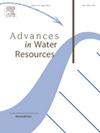A well-balanced conservative high-order alternative finite difference WENO (A-WENO) method for the shallow water equations
IF 4
2区 环境科学与生态学
Q1 WATER RESOURCES
引用次数: 0
Abstract
In this paper, we develop a well-balanced, conservative, high-order finite difference weighted essentially non-oscillatory (WENO) method for the shallow water equations. Our approach exactly preserves the moving-water equilibria of the shallow water equations with non-flat bottom topography. The proposed method consists of two key components. First, we reformulate the source term into a flux-gradient form and discretize it using the same numerical flux as that of the true flux gradient to achieve the well-balanced property. Second, we interpolate the equilibrium variables, which remain constant at steady state, to construct the numerical flux. To achieve high-order accuracy and avoid truncation errors when obtaining equilibrium variables, we build our scheme within the alternative finite difference WENO (A-WENO) framework, which operates on point values rather than cell averages. Special attention is given to ensure that the conservation property is not compromised when designing well-balanced discretizations for the source term. We carefully analyze potential causes of non-conservative schemes in the discretization and explain why the discretized source term in our method is both conservative and simple. Extensive numerical tests are presented to validate the performance of the proposed method.
浅水方程的一种良好平衡保守高阶可选有限差分WENO (A-WENO)方法
本文提出了一种平衡、保守、高阶有限差分加权基本非振荡(WENO)方法。我们的方法准确地保留了具有非平坦底地形的浅水方程的动水平衡。该方法由两个关键部分组成。首先,我们将源项重新表示为通量梯度形式,并使用与真实通量梯度相同的数值通量对其进行离散,以获得良好的平衡特性。其次,我们插入在稳定状态下保持不变的平衡变量来构造数值通量。为了在获得平衡变量时获得高阶精度并避免截断错误,我们在替代有限差分WENO (A-WENO)框架中构建了我们的方案,该框架对点值而不是单元平均值进行操作。在为源项设计平衡良好的离散化时,要特别注意确保守恒性质不受损害。我们仔细分析了离散化中非保守方案的潜在原因,并解释了为什么我们的方法中离散的源项既保守又简单。通过大量的数值试验来验证该方法的性能。
本文章由计算机程序翻译,如有差异,请以英文原文为准。
求助全文
约1分钟内获得全文
求助全文
来源期刊

Advances in Water Resources
环境科学-水资源
CiteScore
9.40
自引率
6.40%
发文量
171
审稿时长
36 days
期刊介绍:
Advances in Water Resources provides a forum for the presentation of fundamental scientific advances in the understanding of water resources systems. The scope of Advances in Water Resources includes any combination of theoretical, computational, and experimental approaches used to advance fundamental understanding of surface or subsurface water resources systems or the interaction of these systems with the atmosphere, geosphere, biosphere, and human societies. Manuscripts involving case studies that do not attempt to reach broader conclusions, research on engineering design, applied hydraulics, or water quality and treatment, as well as applications of existing knowledge that do not advance fundamental understanding of hydrological processes, are not appropriate for Advances in Water Resources.
Examples of appropriate topical areas that will be considered include the following:
• Surface and subsurface hydrology
• Hydrometeorology
• Environmental fluid dynamics
• Ecohydrology and ecohydrodynamics
• Multiphase transport phenomena in porous media
• Fluid flow and species transport and reaction processes
 求助内容:
求助内容: 应助结果提醒方式:
应助结果提醒方式:


